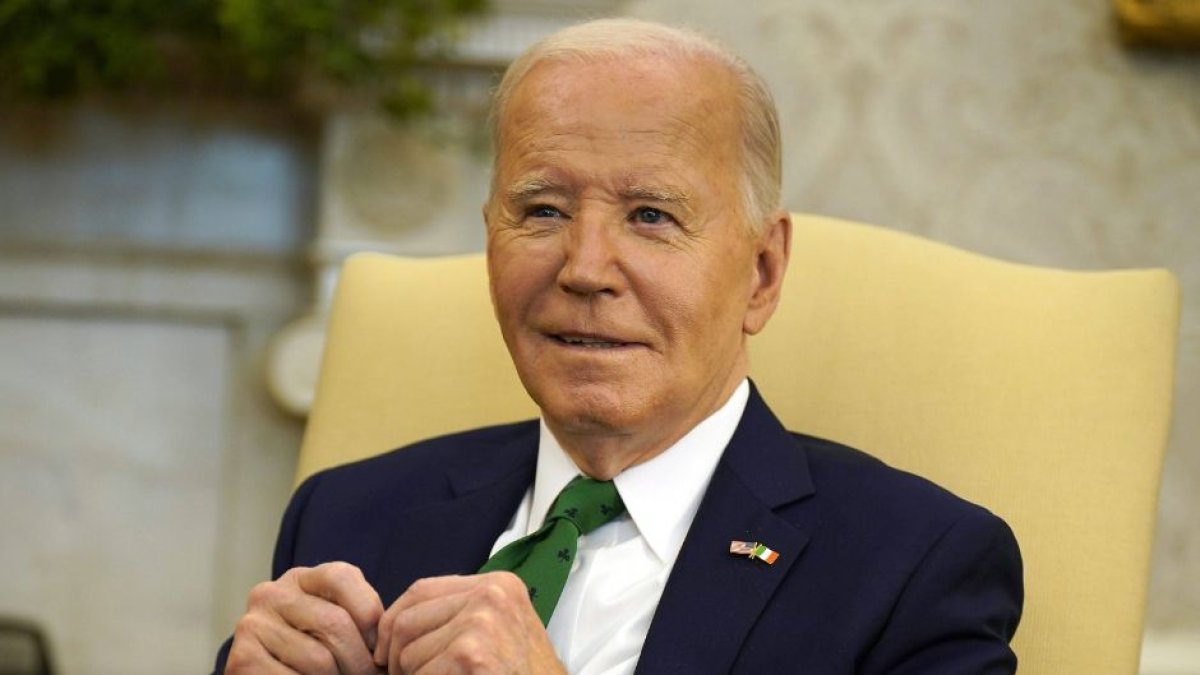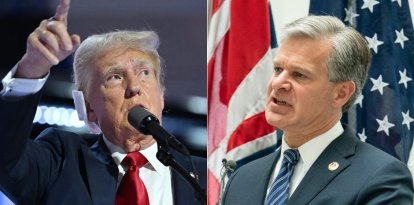A flood of confiscatory taxes and significant funding for the IRS: The pillars of Biden's new budget proposal
The White House published its version of spending for the 2025 fiscal year, and the text stood out for targeting small, medium and large companies in tax matters.

Cordon Press
Joe Biden unveiled his version of the budget for the 2025 fiscal year, which defines all of the federal government's spending and how he plans to finance it. In this case, the Democrat's proposal is riddled with tax increases and succulent funding for the Internal Revenue Service (IRS). Some economists have defined the proposal as "a recipe for the decline of the United States."
The White House recently released a document detailing the budget items for the next fiscal year, and economists quickly noted that its pages contained a sharp tax increase. Far from being only for "the rich," as Biden indicated during the State of the Union, the increases would affect a large portion of citizens.
Under the proposal, the government would spend $7.3 trillion next fiscal year and borrow $1.8 trillion to cover the shortfall from tax revenue.
In the words of Preston Brashers, a fiscal policy researcher at the Heritage Foundation's Grover M. Hermann Center for the Federal Budget, "The Biden administration acts as if business capital is an endless fountain that will never run dry, no matter how much the government siphons out of it, and as if no matter how severely they're taxed, investors will invest just as much, and businesses will keep building, hiring, and raising salaries."
"Unfortunately for the president, even if people were just as motivated to work and invest when the government reaps the rewards from their efforts, the simple fact of the matter is this: it's impossible to invest what the government doesn't allow you to keep, so the fountain eventually runs dry," he added in an opinion article published in The Daily Signal.
Biden and a repeated recipe: Strong tax increases
Among many other increases, Biden devised a 25% capital gains tax on the wealthiest taxpayers before receiving those profits, potentially redefining the income tax.
In addition to generating perverse incentives, the measure would directly hit companies just after an eventual increase in their shares, precisely a good sign that the company in question is ready to grow.
In addition, and again against capital gains, Biden's text would double the tax rate on long-term capital gains and dividends. Currently, the maximum rate for this type of income is 23.8%, and the president's proposal would raise it to 44.6%.
The budget for fiscal year 2025 would also quadruple the tax rate on stock buybacks, inaugurated by the Biden Administration in 2022. A year and a half later, it would go from 1% to 4%.
"Quadrupling this tax would add to the cost of moving capital from where it has less growth potential to where it has greater growth potential. It would encourage large existing companies to hoard capital, to the detriment of cash-starved startups," Brashers wrote.
Another tax hit, this time for small businesses, would be the surcharge on net investment income tax. Indeed, Biden's proposal would expand the tax on business income earned by those who actively run a small business.
"Under Biden's plan, the small business income tax would apply to between $200,000 and $400,000 in income, depending on filing status. These thresholds would not be indexed to inflation, so the tax would apply to smaller and smaller companies over time," Brashers explained.
"Fastest increase in federal debt in history"
Voz Media spoke exclusively with Geoffrey Lawrence, economist and director of research at Reason Foundation, to analyze the president's budget.
According to the expert, the budget itself is destined to fail, as it "includes significant tax hikes on the American people and yet somehow still fails to account for all the new spending it proposes."
"The president's proposed tax hikes could seriously handicap the competitiveness and growth potential of the American economy," he added.
In turn, the economist said that the most controversial points of the president's proposal are the increases to inheritance and capital gains taxes.
"A key plank of good tax policy is that the taxpayer has the wherewithal to pay, meaning they have earned cash and can use it to pay tax bills. By definition, unrealized gains mean the taxpayer has not received cash and so taxing these gains may force investors to liquidate their existing investments to pay tax obligations. The result could be a disastrous decapitalization of American industry while savvy taxpayers seek to safeguard their assets by moving them offshore," he explained.
Finally, he expressed concern about the future of U.S. fiscal accounts if this budget passes through Congress. "The Biden budget would set the federal government on course to spend $87 trillion over the next 10 years and would drive federal debt to $53 trillion by 2034. This would be the fastest increase in federal debt in history," Lawrence said.
Not even death keeps you from Biden's taxes
One peculiarity of the budget is that it adds one more burden to the existing inheritance tax (40%) for estates greater than $7 million. Under the White House proposal, a capital gains tax on unrealized gains would be added before an estate can be transferred.
Historic IRS funding: $104 billion
The 2024 budget had already generated controversy for being particularly generous with the Internal Revenue Service, but it seems that the 2025 budget is not far behind.
In this case, the president is requesting an increase of $104 billion to fund the agency over ten years, taking into account the hiring of additional auditors. If implemented, the IRS would have more personnel than the armies of many countries in the Western Hemisphere.
Goodbye tax cuts for the middle class?
With both houses of Congress under Republican control, Donald Trump enacted the "Tax Cuts and Jobs Act" in 2017, which included the most significant tax cut since 2017. His text included cuts in personal income taxes. Although some provisions were made permanent, many will expire on December 31, 2025, due to how Congress passed the legislation. This is precisely where Joe Biden will intervene.
While the president reiterated that he wanted to extend those cuts for those earning less than $400,000 annually, he found no room to extend the tax cuts in his 10-year, $86.6 trillion budget.
"The administration wants to claim $2 trillion less in added deficits from allowing the middle-class tax cuts to expire, but it also wants to continue to claim it's not directly raising taxes on everyday Americans," Brashers said.
Biden would comply with OECD tax rules
Finally, Biden's budget would adopt Organization for Economic Co-operation and Development (OECD) rules, which would amend U.S. international tax law to align with the global tax system.
These new rules include imposing a minimum of 15% corporate tax worldwide and taxing companies for their activities in low-tax countries, directly combating tax competition between countries.
Ultimately, in the words of House Speaker Mike Johnson (R-LA), Biden's budget "is a roadmap to accelerate America's decline."

























